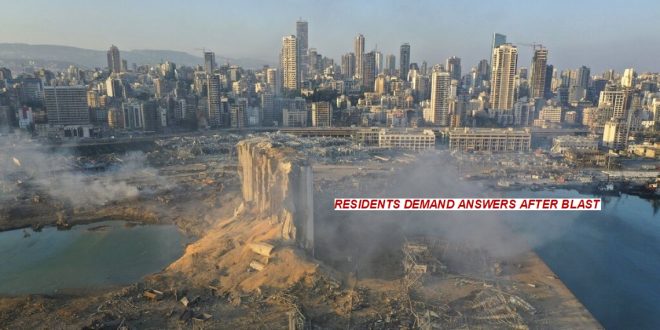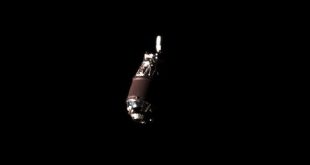06-08-2020
By SJA Jafri + Bureau Report + Agencies + Int’l News Desk + Int’l Monitoring Desk
BEIRUT: People in Beirut have expressed anger at the government over what they say was negligence that led to Tuesday’s huge explosion.
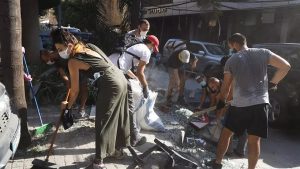 President Michel Aoun said the blast was caused by 2,750 tonnes of ammonium nitrate stored unsafely in a warehouse.
President Michel Aoun said the blast was caused by 2,750 tonnes of ammonium nitrate stored unsafely in a warehouse.
Many have accused the authorities of corruption, neglect and mismanagement.
The blast killed at least 137 people and injured about 5,000 others, while dozens are still missing. A two-week state of emergency has begun.
French architect Jean-Marc Bonfils, involved in rebuilding the city after the civil war, and firefighter Sahar Fares, one of the first responders at the scene, were among the first fatalities to be named. A German diplomat was also among the dead.
“Beirut is crying, Beirut is screaming, people are hysterical and people are tired,” filmmaker Jude Chehab told media, calling for the people responsible to face justice.
Chadia Elmeouchi Noun, a resident currently in hospital, said: “I’ve known all the time that we are led by incompetent people, incompetent government but I tell you something – what they have done now is absolutely criminal.”
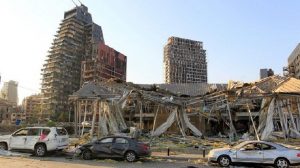 On Wednesday, the government announced that a number of port officials were placed under house arrest pending an investigation into the explosion.
On Wednesday, the government announced that a number of port officials were placed under house arrest pending an investigation into the explosion.
The country’s Supreme Defence Council insisted that those found responsible would face the “maximum punishment”.
Meanwhile, Amnesty International and Human Rights Watch have called for an independent investigation into the blast. In a statement, HRW said it had “serious concerns about the ability of the Lebanese judiciary to conduct a credible and transparent investigation on its own”.
On Thursday President Emmanuel Macron became the first world leader to visit the country – a former colony of France – since the tragedy. He was mobbed as he walked around the city.
He told crowds he would not let aid go to “corrupt hands”, and promised to call for a “new political pact” from the country’s leaders.
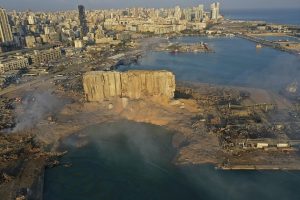 The country is still in shock. Almost every street in the city has been affected by some degree of damage.
The country is still in shock. Almost every street in the city has been affected by some degree of damage.
The historical eastern neighborhood of Gemmayze, known for its vibrant nightlife, is blanketed with broken glass. Windows, doors and in many places the rubble of historic buildings lay strewn around. It is simply beyond comprehension.
The Lebanese who took to the streets last October angry about their politicians are now furious and cannot believe how this could happen. The government says it has arrested several port officials, but for many this is not enough.
Every man in power should be held responsible, they say, and not only junior officials. Lebanese people have long been angry about the corruption and sectarian divisions among their politicians but now it is also about their own safety.
What triggered the explosion?
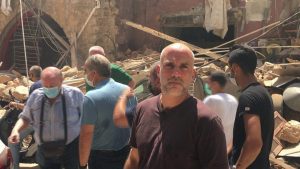 The ammonium nitrate – which is used as a fertilizer in agriculture and as an explosive – had reportedly been in a warehouse in the port for six years after it was unloaded from a ship impounded in 2013.
The ammonium nitrate – which is used as a fertilizer in agriculture and as an explosive – had reportedly been in a warehouse in the port for six years after it was unloaded from a ship impounded in 2013.
The head of the port and the head of the customs authority both told local media that they had written to the judiciary several times asking that the chemical be exported or sold on to ensure port safety.
Port General Manager Hassan Koraytem told OTV they had been aware that the material was dangerous when a court first ordered it stored in the warehouse, “but not to this degree”.
House arrest would apply for all port officials “who have handled the affairs of storing [the] ammonium nitrate, guarding it and handling its paperwork” since June 2014, according to Information Minister Manal Abdel Samad.
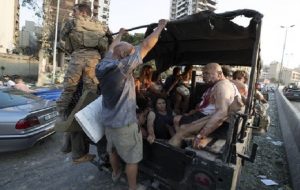 The ammonium nitrate arrived on a Moldovan-flagged ship, the Rhosus, which entered Beirut port after suffering technical problems during its voyage from Georgia to Mozambique, according to Shiparrested.com, which deals with shipping-related legal cases.
The ammonium nitrate arrived on a Moldovan-flagged ship, the Rhosus, which entered Beirut port after suffering technical problems during its voyage from Georgia to Mozambique, according to Shiparrested.com, which deals with shipping-related legal cases.
The Rhosus was inspected, banned from leaving and was shortly afterwards abandoned by its owners, sparking several legal claims. Its cargo was stored in a port warehouse for safety reasons, the report said.
What is the latest on rescue efforts?
Security forces have sealed off a wide area around the blast site, and rescuers have been looking for bodies and survivors under rubble while boats search the waters off the coast. Dozens of people are still missing.
Public Health Minister Hamad Hassan said Lebanon’s health sector was short of beds and lacked the equipment necessary to treat the injured and care for patients in critical condition.
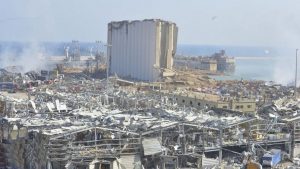 As many as 300,000 people have been left homeless by the blast, Beirut’s governor Marwan Aboud said.
As many as 300,000 people have been left homeless by the blast, Beirut’s governor Marwan Aboud said.
He told media, “Beirut needs food, Beirut needs clothes, houses, materials to rebuild houses. Beirut needs a place for the refugees, for its people.”
Economy Minister Raoul Nehme said the country would have to rely at least partly on foreign aid to rebuild.
“The capacity of the state is very limited, and so is that of the central bank and the banks. We’re not swimming in dollars,” he told Sky News Arabia.
A number of countries have offered humanitarian assistance. Three French planes are due to arrive carrying 55 rescuers, medical equipment and a mobile clinic equipped to treat 500 people.
The EU, Russia, Tunisia, Turkey, Iran and Qatar are all sending relief supplies. The UK is also ready to send medical experts and humanitarian aid, Foreign Secretary Dominic Raab said.
Ammonium nitrate
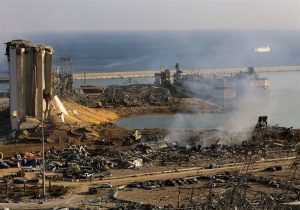 Common industrial chemical used mainly as fertiliser in agriculture
Common industrial chemical used mainly as fertiliser in agriculture
Also one of the main components in explosives used in mining
Not explosive on its own, ignites only under the right circumstances
When it explodes, it can release toxic gases including nitrogen oxides and ammonia gas
Strict rules on how to store it safely: site has to be fire-proofed, and not have any drains, pipes or other channels in which ammonium nitrate could build up
What’s the background?
The explosion comes at a sensitive time for Lebanon. With Covid-19 infections on the rise, hospitals were already struggling to cope. Now, they are faced with treating thousands of injured people.
The country is also going through the worst economic crisis since the 1975-1990 civil wars, and tensions were already high with street demonstrations against the government. People have to deal with daily power cuts, a lack of safe  drinking water and limited public healthcare.
drinking water and limited public healthcare.
Lebanon imports most of its food and large quantities of grain stored in the port have been destroyed causing fears of widespread food insecurity to come. The future of the port itself is in doubt due to the destruction caused.
President Aoun announced that the government would release 100bn lira (£50.5m; $66m) of emergency funds but the impact of the blast on the economy is expected to be long-lasting.
The explosion happened close to the scene of a huge car bombing which killed former Prime Minister Rafik Hariri in 2005. A verdict in the trial of four men accused of orchestrating the attack was due on Friday at a special court in the Netherlands, but this has been postponed until 18 August out of respect for the victims of Tuesday’s blast.
 Pressmediaofindia
Pressmediaofindia
